Dave Besseling on Dystopian Space Babies
(from the davebesseling.com blog i am too lazy to update or fiddle with, for better or worse, here you are...)
This is the rundown on the basic themes of the series. It was written as part of an application to ****, *****, *****, to which I wasn’t accepted, although the painful process of cajoling abstract themes into relatively succinct linguistic snippets has left us with this rambling amble through the creative process. I’m still not sure if I want to share this, thinking it may kill some of the fun, so this post may just disappear one day.
Anyways, here you go….
Dave Besseling- Description Of Works. ****** ***********, 2006
SERIES 1. Dystopian Space Babies.
This series is a metaphorical expression of an all too common trajectory traced from the birth of an idea to its eventual transformation when exposed to subjective individuals on a large scale. The clearer the idea, with all the greater the fervour will egos latch onto it, digest it and regurgitate it into a watered down version suitable for mass consumption, essentially killing any brilliance or lucidity of the original observation. This seems to be the case with any enlightened spiritual path once it becomes an organized (homogenized) religion. Same goes for the transformation of social theory or criticism when applied as a political system. I have tried to represent both these paths in this series. The chosen ideology is that which can be found in Chairman Mao’s little red book, but I hope to illustrate how it can be interchangeable with other ideological or dogmatic entities. The milk jugs found in each piece are key; the life giving liquid is the constant thread of the series, and we can see how the various personages react to it at each stage. Of course by the end of the cycle, the original nectar has soured in the hands of greed. As I see it, this process of devaluation, this misguided sprint to utopia can be explained in six steps.
I like to call them the six tenets of dystopia.
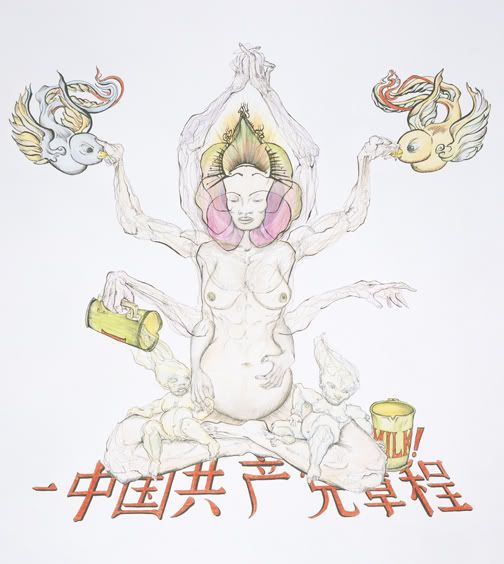
Step 1: CONCEPTION. This is the idea in its initial moment of creative insight. Abstract associations coagulate and take form in the silent mind of an individual. This contemplative moment is the root of all forms of creativity. At this stage, no moral pinnings have classified the idea in any context of right or wrong. This is freedom unfettered my the clusterbomb of the monkeymind.

Step 2: ABSORBTION. The idea, now essentially a meme (here I use the word “meme” as it is described by Howard Bloom. see his book “Global Brain”, and also “Spiral Dynamics” by Don Beck) is shared and absorbed by other individuals, who with their own subjective worldviews take the original concept and make sense of it through their own filters, this creates the initial compulsion towards hierarchical power struggle.
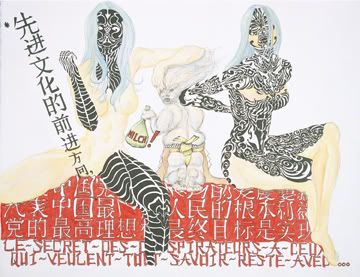
Step 3: POPULARIZATION. This is where the real spreading of the idea comes into play in order to promulgate a distilled version of the ethos so the masses can latch onto it more quickly. Propaganda is issued, preying on the base desires that people are most easily tempted by. Fundamental urges are played to- in this case, I’ve used siren like sexpots to sell the idea (no, not an original concept to be sure, more of a comment on the ubiquity of propaganda/advertising that uses sexual longing, guilt and inadequacy as a vehicle to peddle wares). We can see the milk bottle as more of an intoxicant by this point….
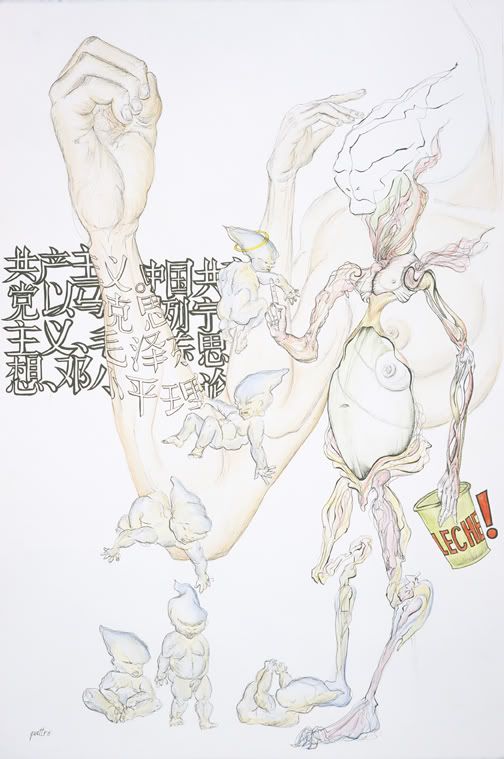
Step 4: INSEMINATION. The idea is well and truly an ideology in this image, hedgemonically compact enough to gather a large scale group to rally around a leader. Here we can see some fleeing the impending fascism (literal or metaphorical) and the milk being controlled and doled out in doses as the power figure sees fit. Here it is an espece of mutated mother figure.
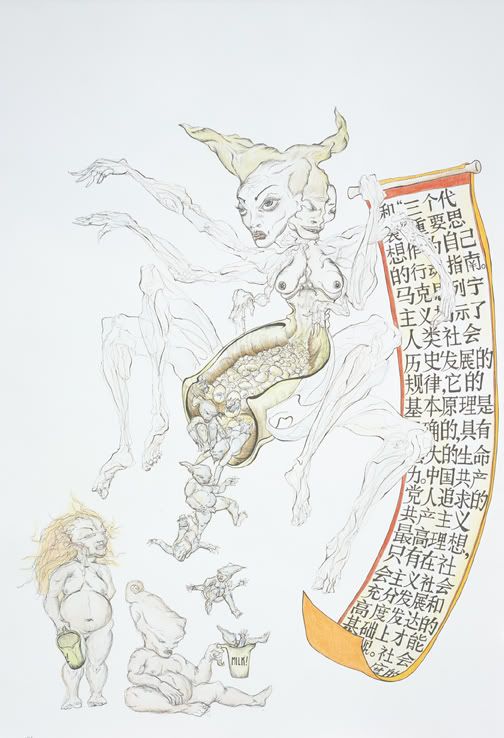
Step 5: DISSEMINATION. The machine is in full swing, the clones are under control and more and more entities are being pandered to and brought together under the umbrella of the ethos. Seeing them as insects is apt. the proliferation of clones, inebriates blind to the germinal ideology that now borders on religion as the banners of law and order fly.
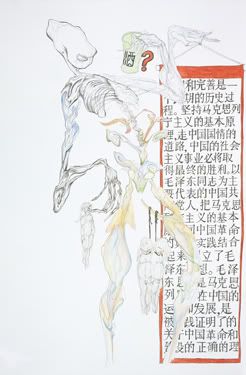
Step 6: INDOCTRINATION. All semblance of the original idea has been corrupted. Control is now totalitarian. Any nutrition from the original holding vessel is empty. The snowball effect of greed and ignorance has created this monster, unaware of his own emptiness. The casualties of the fight for truth and preservation of the seedling hang from one of its legs. The cycle is over, it’s had its time and soon, it will be replaced by another idea, another despot, another martyr - and the cycle will begin again.
This is a frank observational series of work, perhaps even slightly pessimistic and melodramatic; however the sense of helplessness in face of seemingly impenetrable ziggurats is one that many of us can relate to on various levels of understanding in this world we find ourselves in today. The thinking individuals that managed to escape offer hope that this destruction will not keep repeating itself. I am waiting for the inspiration where I can find a positive and active way to illustrate what can break the cycle. This is something that must be lived, i suppose.
|
So, you wanna get published!
the following is an article i recently published concerning people who want to write for publication. it just scratches the surface, but i think some folks might get something out of it.
Wanna get published?
One of the questions i’m most often asked is “how does somebody go about getting their poems published?” you know the kind of stuff…someone will invariably come up to me after a reading and say something like: “my son wants to be a writer. he writes the nicest poems and wants to publish them some day…can you help him out?” my first response is always to tell that person to always have a fall-back, because if he or she thinks they’re going to make any money at this, then they’re deluding themselves or have been sorely misinformed. i’ve been publishing for 38 years and it’s only in recent years that i’ve made anything more than lunch money at it. no, poetry’s a game for amateurs. that’s not even true. an “amateur” is someone who does something solely out of love for what they’re doing. if that’s all you’re doing…if you’re not compelled to write poems…to dig into your heart and see if you can come up with something fresh and true and alive…if you’re only writing poetry because you “love” to do it then go post your poems on some internet site and be happy with everyone commenting on your words with statements like “thanks for the great read” and “well said” and “nice write”.
if you want to be a writer…if you TRULY want to be a writer (and i’m not saying “poet” here, because that term’s been so devalued these days by everyone and his brother calling themselves poets that it’s become practically worthless. even after 16 published books i refuse to call myself a poet because i feel i haven’t yet earned the term.)…anyway, if you TRULY want to be a writer who stands out of the crowd then you MUST be in print. okay, you can cut a lot of corners and go directly to people like Publish America and Lulu who will print your book for nothing or practically next to nothing…but if you don’t first do your homework and lay a good solid foundation, then i absolutely guarantee you that your book won’t sell more than a hundred copies and most of them will be to family and friends and few of those copies will ever get read because they’re only buying your book to be nice to you or to get you off their back. guaranteed.
no, the only real way to get published is to do it the hard way…one step at a time. and that takes work and dedication and perseverance. let me back up a bit right now. as a writer you have to be able to split yourself in two. there’s got to be the artistic “writer” side of you…the one who does the writing and thinking and loving and growing. then there’s got to be the level-headed “business” side to you as well. i can’t stress this hard enough or often enough that unless you work at it with a plan, and work at it as often as you can, then you’re setting yourself up for failure. let’s face it…becoming a published, respected writer takes a plan that’s followed and maintained and modified over the years just like any other venture. first of all you need to start sending things off to magazines…print magazines. and if you’re thinking right now “where do i find print magazines that publish poetry?” then stop reading this right now because you’re wasting my time and yours, because you don’t care enough to do what it takes. Go to Borders or Barnes and Noble…check out the magazines. there’s tons of magazines. buy a couple and start reading. chances are they have ads in them for other magazines. check those out as well. start doing your homework. start making lists of magazines you’re going to submit to. better yet, go into any one of those stores and buy yourself a copy of “Poet’s Market”. for someone just starting out it’s an indispensable tool. it lists thousands of small magazines and small publishers who publish poetry. and if you contact any one of them and they mention money…YOUR money…run for the hills. you’ve seen the ads…”Publisher looking for poets”…”let your poems earn big bucks”. the only thing these people are looking to do is part you from your big bucks.
Poet’s Market lists all sorts of good things…the magazine or book publishers who do poetry, and the listings contain all sorts of great information like the contact people, the type of poetry they’re looking for, the guidelines for submission etc etc etc.
like i said…have a plan. start small. don’t think that you’re going to get anywhere by starting off sending your work to The Paris Review or The New Yorker. you’re wasting your time. start small. take a small first step.
let’s talk about basics. it’s like anything else. the more you do it, the better you’re going to get at it. sending stuff out to the magazines is an acquired habit just like anything else.
do something every day. write something. send something off to a magazine. edit something you’ve written. send something off to another magazine. i don’t care what it is, but do something every single day. and don’t give up. and don’t send some poems off to a magazine and sit back and wait till you get an answer. no, put together another batch of poems (different poems. never have duplicate submissions circulating) and send them off to another magazine. keep records of what you’ve sent to each magazine and what the results were. this will keep you from duplicating efforts and also give you a better idea of which of your poems they liked or didn’t. chances are you’re going to start off by getting rejected. don’t worry, it happens to everyone and never goes away. like i said, i’ve been publishing for 38 years… i’ve had nearly 900 poems published in magazines around the world and still get more rejections than acceptances. if i had to make a guess, i’d estimate that over the years i’ve had something like 3000 rejections. that’s just part of the game. too often i talk to people who say “i want to be a writer, but i sent some poems to two different magazines and they got rejected”. tough. send more out. getting published is not brain surgery. anybody can get published if they want it bad enough and try hard enough. it’s strictly a numbers game. almost like sales. the more doors you knock on, the better your chances are. so, keep things in the mail.
and when you send things out to magazines, respect the editors. don’t send works in progress, or sloppy work. don’t expect the editors to do your job for you. they’re too busy for that. years ago i used to edit two different little magazines and while the circulation was next to nothing i used to get 15 to 20 submissions a day and anything that i opened up that didn’t look complete or professional didn’t even get a second look. it went right in the can.
i’m jumping around a bit here, but i’m trying to cover a lot of territory in a short space of time. so, that being said, let’s talk again about why i’m suggesting you start with the print magazines…because like it or not, no matter how small or ratty the magazine is, publication (whether you admit it or not) commands respect. that’s where the real audience is. unlike the internet, where everything’s free, people have to shell out their hard earned cash to buy a magazine. that means something. that shows they’re serious.
okay, so you start sending stuff out to magazines and you’re getting some feedback…usually at first it’ll be negative because you don’t know anyone and nobody knows you. when you get a rejection, don’t just throw it away and move on to the next one…send the editor a thank you letter or e-mail or note. thank him or her for taking the time to read your work and say “i know you didn’t like what i’d sent, but might you be interested in seeing something else? or, do you know of another magazine that you think might be a better fit for my poems?” network. build up your contacts. then, when you finally get something accepted somewhere (and i guarantee you will, if you try hard enough and look hard enough), use that to your advantage. send more poems out to other magazines with a note saying something like: “i recently had some of my other poems accepted by Buttcheek magazine. i’m hoping you’ll find something here that you like”.
it’ll take time. it won’t happen overnight. but, sooner or later you’ll start to build up a readership. people will recognize your name. then, after a while you’ll start to know which magazines also have a book publishing side to them and by that time you’ll be more familiar with the editors and you won’t be afraid or embarrassed to ask them if they’d be interested in seeing a manuscript for a book. that’s it. there’s no big secret to it. no mystery. it’s just a matter of hard work and determination.
then, when you finally get your book published, people will know your name. a few at least. certainly more than your Aunt Mary and your fat cousin Tony.
please, don’t let yourself be counted among those “artistes” who think the world’s going to beat a path to your door because you’re just so damned good and deserve to be published and known the world over. it’s just not going to happen. it’s up to you. you’ve got to make it happen.
when i was a kid, growing up, just starting out wanting to be a writer, the guys i hung with also wanted to be writers and they had so much more talent than me…but they couldn’t be bothered to look at the “business” side of this because they were above that…they were artists. they figured that they were so good that word would get around about them and people would come to them. they’re still very talented. and they’re still waiting.
that’s it. i’ve talked enough. now it’s your turn. let’s see if you’ve got what it takes.
Since 1970 John Yamrus has published 2 novels, 14 volumes of poetry and nearly 900 poems in magazines around the world. Recently, selections of his work have appeared in translation in the Romanian magazine Antiteze. His newest book of poetry is SHOOT THE MOON.
by John Yamrus 2007
|